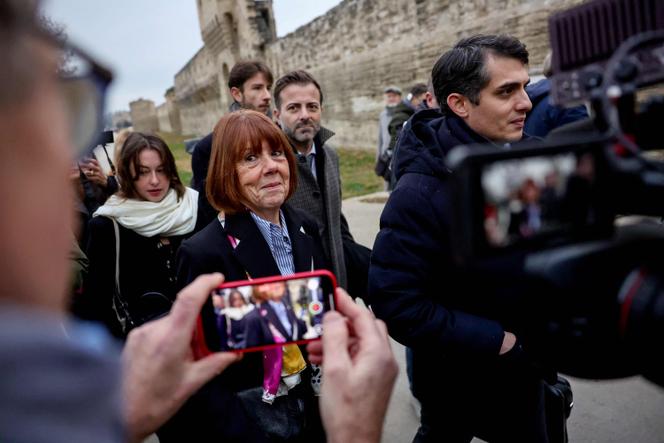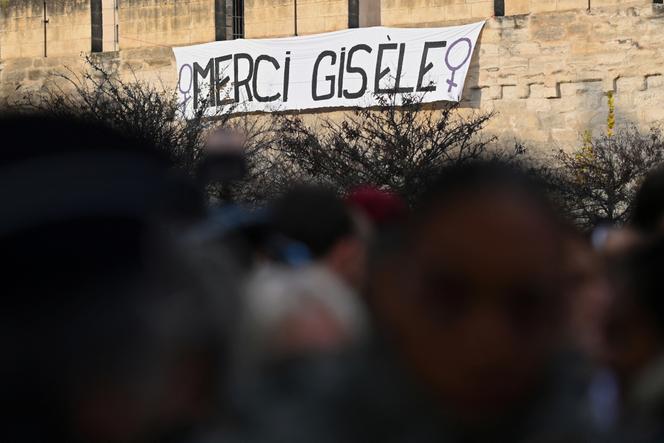


A court on Thursday, December 19, sentenced Dominique Pelicot to 20 years in jail for committing and orchestrating the mass rapes of his now former wife Gisèle Pelicot with dozens of strangers. Her children expressed disappointment at what they saw as overly-lenient sentences for the other men convicted.
The convictions of all 51 defendants and their sentencing brought to a close a three-month trial that has horrified France, resonated across the world and turned Gisèle Pelicot into an icon of female courage.
Dominique Pelicot, who had already confessed to the crimes, was earlier found guilty by the court in the southern city of Avignon. His 50 co-defendants were also convicted by the court, with no acquittals. They received jail terms of between three and 15 years – less than what prosecutors had demanded. Two of these defendants had their prison terms suspended.
The three Pelicot children "are disappointed by these low sentences," said a family member, asking not to be identified, adding that there was "no question" of any of the children wanting to speak to their father after the conviction.
Tension was palpable in the courtroom at the start of the hearing, where a heavy police presence was deployed. Many defendants arrived with their bags packed ready for prison. One of them was in tears as he hugged his companion before entering the courtroom.
"Mr. Pelicot, you are found guilty of the aggravated rape of Gisèle Pelicot," said the presiding judge of the criminal court, Roger Arata. Delivering sentence, Arata said Dominique Pelicot will not be eligible for parole until he has served two-thirds of his sentence.
Dominique Pelicot, 72, has admitted to drugging Gisèle Pelicot for almost a decade so he and strangers he recruited online could rape her. His lawyer did not rule out appealing the verdict. "We're going to use the 10 days which we have to decide whether or not to appeal this decision," Béatrice Zavarro told reporters.
Gisèle Pelicot, 72, has become a feminist hero at home and abroad for refusing to be ashamed, waiving her right to a closed trial and standing up to her aggressors in court. Alongside her ex-husband, 50 other men aged 27 to 74 have been on trial, including one who did not abuse her but raped his own wife with Dominique Pelicot's help.

Earlier Thursday, Gisèle Pelicot arrived at the courthouse smiling and cheered by crowds of supporters and feminist activists waiting outside. They chanted her name and slogans like "Justice for Gisèle" and "Shame has Changed Sides".
On November 25, prosecutors requested the maximum sentence against Dominique Pelicot for aggravated rape. It was widely expected that Dominique Pelicot would receive the full 20-year term, but considerably more uncertainty had surrounded the sentencing of the other defendants. The prosecution had requested 10 to 18 years in prison against the 49 defendants also charged with aggravated rape. One of these accused is on the run and being tried in absentia.
One more accused – facing the lesser charge of groping – had risked up to four years in prison. Thirty-two of the accused attended the trial as free men while the others, including Dominique Pelicot, were remanded in custody.
"Rape affects women all over the world, that's why the whole world has its eyes on what's going to happen," said Ghislaine Sainte Catherine, one of the members of the Amazons of Avignon feminist collective.
Gisèle Pelicot's children, David, Caroline and Florian, arrived half an hour earlier, entering the courtroom alongside a group of men accused of raping their mother. "We came with our things for prison," said one of the defendants, pointing to the sports bags on the ground.
The case has sparked protests and drew fresh attention to male violence in France. Rights activists hope that the trial will lead to change in society. "It's time that the macho, patriarchal society that trivializes rape changes," Gisèle Pelicot said in November.
Her pictures dominated the front pages of major French papers on Thursday. "A verdict for the future," said left-leaning Libération. "Merci madame," said L'Humanite, while La Provenance declared "the moment of truth."
Sylviane Agacinski, philosopher: "Rape is not a result of masculinity but of its perversion"
Hélène Devynck, journalist: "The defense is a chemically pure sample of patriarchal violence"
Noémie Renard, essayist: "The trial shows the extent to which sexual violence is integrated in our society"
Camille Froidevaux-Metterie, philosopher: "Yes, all men are guilty, guilty of remaining indifferent"
Nathalie Heinich, sociologist: 'No, not all women think all men are guilty!'
Sylviane Agacinski, philosopher: 'Rape is not a result of masculinity but of its perversion'
Katie Ebner-Landy, historian: 'The Pelicot case fractures our sense of reality: We do not know who to trust, we cannot be sure of anyone's identity'
Irène Théry, sociologist: 'Opportunity-based rape is at the heart of the social issue at stake in the French rape trial'
Christine Bard, historian: 'The idea of the monster rapist has protected countless criminals in overalls, ties and robes'
Caroline Fourest, essayist: 'Let's avoid abusing #MeToo to settle scores and get rid of people'
Anne Bouillon, lawyer: 'Opportunistic rape is much more common than you might think'
Elisabeth Roudinesco, historian and psychoanalyst: 'Dominique Pelicot and his co-defendants are not ordinary men'
Florian Vörös, researcher in information and communication sciences: 'Sexual violence can be explained not only by a lack of education, but also by a lack of interest and activism by men'
ludi demol defe, specialist in gender issues, and Valérie Rey-Robert, feminist author: 'Presenting the defendants as victims of porn contributes to rape culture'
